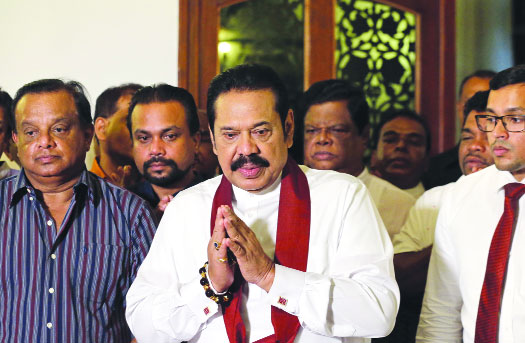Sri Lanka’s much disputed Prime Minister and strongman Mahinda Rajapaksa’s ill-advised move to manipulate the nation’s executive with impunity and suit his partisan and political ambition has clearly backfired and cost the nation a stasis it could hardly afford. With a crucial budget held up and countries wondering which government to deal with — the ousted one of UNP’s Ranil Wickremesinghe or the coalition sanctioned by President Mathiripala Sirisena with Rajapaksa as imposed Prime Minister — the island nation was on the precipice. Thankfully the Supreme Court ordered the reinstatement of status quo ante after Rajapaksa repeatedly failed to prove a majority in the Parliament, which President Sirisena dissolved to hold snap polls. The court sternly reminded that a nation cannot be held hostage to a person’s whim and muscle and that neither elections nor the dissolution of Parliament can be forced upon a system that already had a working majority and ability to last out a full term. The court underlined that the Constitution could not clearly be interpreted in personalised ways. Yes, Rajapaksa was clawing his way back to relevance after he was trounced by his one-time protege and then rebel Sirisena. But as Sirisena and Wickremesinghe had difficulty negotiating with each other along the way, Rajapaksa swiftly played on the heft of restoring Sinhalese identity, floated his new outfit and topped the verdict in the local elections. At this point, he clearly overreached himself, cornering President Sirisena in his impatience, forcing him to pull out of the coalition Unity government, coopt his party and name him Prime Minister. Now that Wickremesinghe has legitimacy and sympathy for being turfed out abruptly, Rajapaksa is left with ghosts of his past out to devour him — allegations of autocracy, corruption, nepotism, China tilts and, of course, war crimes while eliminating the Tamil movement from the face of the island. If indeed he had waited out for Wickremesinghe to fail at the hustings, he could have attempted a return to Lanka’s narrative and wiped off his past. Now, all anybody will remember is his avarice. Constitutionally, he could not have become the President, having served two terms, but he could have attempted a comeback as a prime ministerial hopeful though people anticipated he would move amendments to arrogate more powers to himself. Sirisena, seen as an acceptable moderate when he took over the reins, has had a greater loss of face. His UPFA was in a minority in the coalition (even with Rajapaksa’s faction) and yet he ventured to sack Wickremesinghe, whose UNP has the bigger mandate.
India can now breathe a tad easy as it was uncomfortable with Rajapaksa though the latter had engaged with the Modi government in Delhi very recently. As President, he had parcelled the nation’s ports and infrastructure to the Chinese. Wickremesinghe has been more favourable for us. His ouster, in fact, was a result of Sirisena’s disagreement with him over the development of a container terminal in Colombo and his pro-India tilt. Therefore, India has to tip-toe cautiously around the prevalent anti-mainland narrative and develop a strategic depth at a time when the hawks have been compromised.
Writer and Courtesy: The Pioneer








 OpinionExpress.In
OpinionExpress.In















Comments (0)